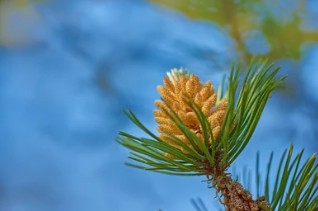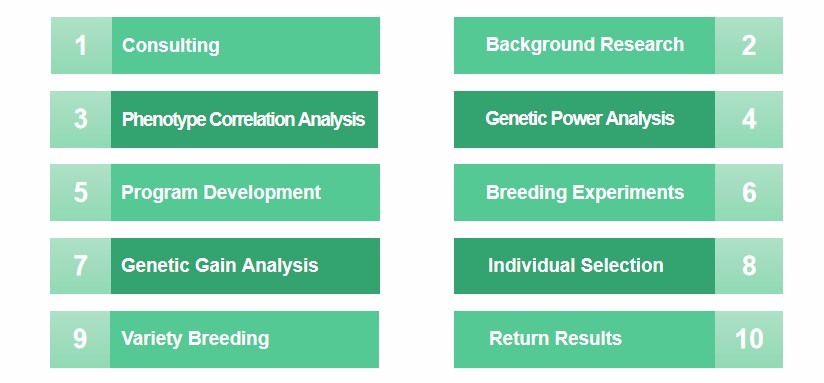
Masson pine (Pinus massoniana, P. massoniana) is native to China and is a large tree of the Pinaceae and Pinus genus. P. massoniana wood contains 62% cellulose, which can be used as an essential raw material for building timber, sleepers, ore pillars, paper, and man-made fiber industries after degreasing. P. massoniana has fast growth and strong adaptability and has been artificially introduced and cultivated in many countries.
P. massoniana is one of the most essential oleoresin production species. It can extract various oils such as turpentine, pine needle oil, pine nut oil, and pine tar. The products are widely used in pharmaceutical and chemical production. Trunks, roots, etc., also have certain medicinal value and can be used in traditional medicine to treat cough, gastric and duodenal ulcers, etc. P. massoniana is tall and majestic, has strong adaptability and strong wind resistance, and is a high-quality garden landscape tree species.
Lifeasible provides forest tree breeding services all year round and has a team of scientists with rich experience in plant breeding. Relying on the leading comprehensive plant service platform, we guarantee to provide you with the most comprehensive P. massoniana breeding service to create higher forestry economic benefits.
P. massoniana has excellent characteristics such as fast-growing, high yield, stress resistance, and wide application, and its breeding value is quite high. Lifeasible's reserve-based breeding technology and years of experience in P. massoniana breeding work can quickly and accurately help customers breed high-quality tree species that are stable, high-yield, and resistant to harsh environments.
We can provide you with multi-generation breeding, genetic engineering breeding, and other methods according to customers' needs for different characteristics of P. massoniana wood properties, environmental tolerance, secondary metabolites, etc.
We have preserved several high-quality P. massoniana species with rapid growth, high fiber content, and high-fat yield. Based on first- and second-generation breeding, the nested mating design is used to reveal the genetic differences between different hybrid combinations and provide customers with various tree species resources.
According to the growth of P. massoniana, wood characteristics, and rooting ability of cuttings, a two-step screening method was used to screen out multiple P. massoniana clones from the superior provenance forest progeny test, mixed forest, and seed garden. The average plant height, diameter at breast height, and wood density of the progeny clones can be effectively increased.
Using SMRT full-length transcriptome and Illumina RNA technology, transcriptome analysis of P. massoniana oil biosynthesis-related genes can be performed, and tree species with different oil yield characteristics can be marked and selected. This molecular marker helps breeders understand the genome information of P. massoniana and greatly facilitates the selection of P. massoniana. Using these techniques, we can carry out genetic engineering breeding of P. massoniana.

Relying on advanced plant molecular technology, efficient information analysis capabilities, and abundant tree species resources, Lifeasible efficiently promotes selecting and breeding high-quality tree species of P. massoniana. We are very much looking forward to working with you on a pleasant project, if you would like to know more about our service details, please do not hesitate to contact us.
Reference
Lifeasible has established a one-stop service platform for plants. In addition to obtaining customized solutions for plant genetic engineering, customers can also conduct follow-up analysis and research on plants through our analysis platform. The analytical services we provide include but are not limited to the following:
Get Latest Lifeasible News and Updates Directly to Your Inbox
Adaptive Evolutionary Mechanism of Plants
February 28, 2025
Unraveling Cotton Development: Insights from Multi-Omics Studies
February 27, 2025